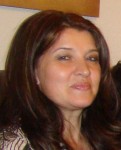A Brief Biography of Hedina Tahirović Sijerčić
 Hedina Tahirović Sijerčić was born on November 11, 1960. in Sarajevo, Bosnia - Herzegovina. She is a journalism graduate, a writer, a poet, an educator, and the first Bosnian television and radio presenter and producer of Romani origin.
Hedina Tahirović Sijerčić was born on November 11, 1960. in Sarajevo, Bosnia - Herzegovina. She is a journalism graduate, a writer, a poet, an educator, and the first Bosnian television and radio presenter and producer of Romani origin.
While working in Sarajevo, she organized and hosted Romani TV and radio programs, and worked as an activist for the International Romani Union. Later, she lived in Toronto, Canada and worked as a teacher for the Toronto District School Board, eventually becoming the Editor-in-Chief of the first Canadian-Romani newsletter “Romano Lil” between 1998–2001.
Ms. Tahirović Sijerčić won the “Best Promotion” prize for her presentation of her book, “How God made the Roma” at the XXI. International Book Fair in Sarajevo. In 2010 she won the prize for best literary creation of 2010 with her poetry book “Ašun, haćar dukh” (Listen, feel pain), and a second international poetry prize, “The golden pen of Papusza” of Tarnów, Poland.
She presently lives in Germany.
“Hedina”, the documentary
Thanks to permission from Radiotelevizija BIH - BHRT, we are pleased to offer you 3 minutes of excerpts from the broadcaster's 2009 documentary about Ms. Tahirović Sijerčić:
Title: Hedina
Release Year: 2009.
Production: Radiotelevizija BIH - BHRT
Country: Bosnia - Herzegovina
Duration: 25 minutes
Director: Zoran Kubura
Screenplay: Zoran Kubura, Haris Kulenović
Photography: Zoran Kubura
“Hedina is the first Roma with a bachelor's degree in journalism in Bosnia - Herzegovina. Several years before the war, she worked at RTV Sarajevo as an editor and a host of a programme for Roma. With the outbreak of war, her refugee story starts, and it has not stopped since. From refugee camps in Germany to Canada, she is haunted by dreams and nostalgia. Her books and poems sprang from these dreams. Once a year she visits Gorica, her district in Sarajevo, and she surrenders to the memories of her childhood and adolescence. There, her work makes sense, and every time it is more and more difficult to go back to the world. As she revisits places from the past, she tells her stories of the Sarajevo Roma's hard life, and her own life among them.”
Partial Bibliography
- Canadian Romani Pearls (Kanadake Romane Mirikle) in English & Romani, 1999.
Roma Community and Advocacy Centre, Canada
As Editor in Chief - Na dzanen aver, gova si amaro dzuvdipe (How We Live) in Romani, 2001.
Medica Zenica-Infoteka, Bosnia - Herzegovina
As Translator - Romany Legends in English & German, 2004.
Turnshare, United Kingdom
As Author - Ciknoro Princo (The Little Prince) in Romani, 2008.
The Bosnian Word, Bosnia - Herzegovina
As Translator - Stare romske bajke i price (Old Romani legends and folktales) in Bosnian & Romani, 2008.
The Bosnian Word, Bosnia - Herzegovina
As Author - Dukh - Pain in English & Romani, 2008.
Magoria Books, Canada
As Author - Hasanaginca theatrical play in Romani, 2008.
The Bosnian Word, Bosnia - Herzegovina
As Translator - Parno them, kotorvalo them (White World, Colourful World) in Romani, 2008.
The Bosnian Word, Bosnia - Herzegovina
As Translator - Bosnaki - Romani alavari (Bosnian - Romani dictionary), 2009.
Romani - Bosnaki alavari (Romani - Bosnian dictionary), 2009.
As Compiler & Author - Rromane Paramicha: Stories and Legends of the Gurbeti Roma in English & Romani, 2009.
Romani Folktales I: An Unusual Family in English & Romani, 2009.
Romani Folktales II: How God made the Roma in English & Romani, 2009.
Romani Folktales III: Romani Prince Penga in English & Romani, 2009.
Romani Folktales IV: Karankochi-Kochi in English & Romani, 2010.
Romani Folktales V: Four Brothers in English & Romani, 2010.
Magoria Books, Canada
As Author